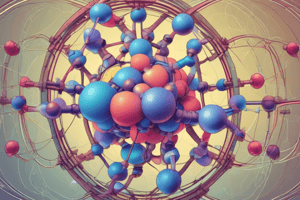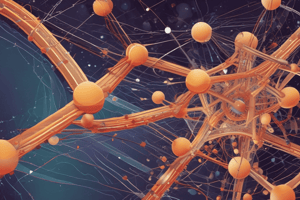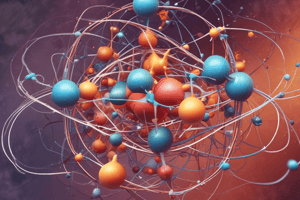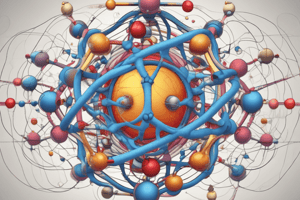Podcast
Questions and Answers
What is the defining characteristic of a solid?
What is the defining characteristic of a solid?
- Has a fixed shape and volume (correct)
- Has neither a fixed shape nor a fixed volume
- Has a fixed volume but takes the shape of its container
- Has a fixed shape but takes the shape of its container
What is the unit of measurement for mass?
What is the unit of measurement for mass?
- Grams (g) or kilograms (kg) (correct)
- Cubic centimeters (cm³)
- Liters (L)
- Grams per cubic centimeter (g/cm³)
Which of the following is an example of a physical property of matter?
Which of the following is an example of a physical property of matter?
- Solubility
- Rusting
- Burning
- Melting Point (correct)
What type of change occurs when ice melts?
What type of change occurs when ice melts?
What is the term for the ability of a substance to dissolve in a solvent?
What is the term for the ability of a substance to dissolve in a solvent?
What type of matter has neither a fixed shape nor a fixed volume?
What type of matter has neither a fixed shape nor a fixed volume?
What is the term for the temperature at which a liquid changes to a gas?
What is the term for the temperature at which a liquid changes to a gas?
What type of change occurs when wood is burned?
What type of change occurs when wood is burned?
What is the term for the mass of an object per unit volume?
What is the term for the mass of an object per unit volume?
Study Notes
Types of Matter
- Solid: Has a fixed shape and volume. Examples: rocks, books, chairs
- Liquid: Has a fixed volume but takes the shape of its container. Examples: water, oil, juice
- Gas: Has neither a fixed shape nor a fixed volume. Examples: air, helium, oxygen
Characteristics of Matter
- Mass: The amount of matter in an object, measured in grams (g) or kilograms (kg)
- Volume: The amount of space occupied by an object, measured in cubic centimeters (cm³) or liters (L)
- Density: The mass of an object per unit volume, measured in grams per cubic centimeter (g/cm³)
Physical Properties of Matter
- Color: The appearance of an object when light is reflected or transmitted through it
- Odor: The smell of an object
- Texture: The feel of an object's surface
- Taste: The sensation of an object's flavor
- Solubility: The ability of a substance to dissolve in a solvent
- Boiling Point: The temperature at which a liquid changes to a gas
- Melting Point: The temperature at which a solid changes to a liquid
Changes in Matter
- Physical Change: A change in which the substance remains the same but its physical properties change, such as melting or boiling
- Chemical Change: A change in which the substance itself changes, such as burning or rusting
Examples of Changes in Matter
- Melting: Ice (solid) → Water (liquid)
- Boiling: Water (liquid) → Water Vapor (gas)
- Rusting: Iron (metal) → Iron Oxide (rust)
- Burning: Wood (solid) → Ash (solid) + Carbon Dioxide (gas)
Types of Matter
- Solids have a fixed shape and volume, with examples including rocks, books, and chairs.
- Liquids have a fixed volume but take the shape of their container, with examples including water, oil, and juice.
- Gases have neither a fixed shape nor a fixed volume, with examples including air, helium, and oxygen.
Characteristics of Matter
- Mass is the amount of matter in an object, measured in grams (g) or kilograms (kg).
- Volume is the amount of space occupied by an object, measured in cubic centimeters (cm³) or liters (L).
- Density is the mass of an object per unit volume, measured in grams per cubic centimeter (g/cm³).
Physical Properties of Matter
- Color is the appearance of an object when light is reflected or transmitted through it.
- Odor is the smell of an object.
- Texture is the feel of an object's surface.
- Taste is the sensation of an object's flavor.
- Solubility is the ability of a substance to dissolve in a solvent.
- Boiling point is the temperature at which a liquid changes to a gas.
- Melting point is the temperature at which a solid changes to a liquid.
Changes in Matter
- Physical changes involve a change in physical properties, but the substance remains the same.
- Chemical changes involve a change in the substance itself.
Examples of Changes in Matter
- Melting involves a solid changing to a liquid, such as ice turning into water.
- Boiling involves a liquid changing to a gas, such as water turning into water vapor.
- Rusting involves iron changing to iron oxide, resulting in rust.
- Burning involves a solid changing to a solid and a gas, such as wood turning into ash and carbon dioxide.
Studying That Suits You
Use AI to generate personalized quizzes and flashcards to suit your learning preferences.
Description
Learn about the three main types of matter: solid, liquid, and gas, and their characteristics such as mass and volume.




